今天雅思无忧小编为大家带来了2023年11月23日雅思听力考试真题及答案(2023年10月19日雅思阅读考试真题及答案),希望能帮助到大家,一起来看看吧!
本文目录一览:

2023年11月23日雅思听力考试真题及答案
您好,我是专注留学考试规划和留学咨询的小钟老师。在追寻留学梦想的路上,选择合适的学校和专业,准备相关考试,都可能让人感到迷茫和困扰。作为一名有经验的留学顾问,我在此为您提供全方位的专业咨询和指导。欢迎随时提问!
上周完成了最新的雅思考试,那么你知道考试的情况怎么样嘛?来跟着小钟老师一起看一看2023年11月23日雅思听力考试真题及答案。
一、考题解析
场景话题:
S1 鸟类保护组织/ S2 煤炭矿场博物馆/ S3 慢时尚/ S4 金属回收
题型设置:
S1:填空 S2:地图+填空+多选 S3:单选+配对 S4:填空
二、名师点评
本次考试答案如下:(仅供参考)
S1:birds,tent,mountains,swim,waterfall,cave,back,walking boots,discount,insurance
S2:1988,social,underground,reception,notice board,B ,E, B,A,C
S3:A, B, C, A, E, A, B, C, D, G
S4: statue,farm,economy,quality,electronics,plants,factories,pipes,magnet,bacteria
点评:
本场考试整体难度偏难,尤其是2、4两个部分。地图题又一次出现,近两年大部分时候保持1、4两部分填空,2、3两部分选择题。在这里建议大家在平时要多关注每周的考情回顾,对自己报考的场次可能出现的题型有一个大致的了解,以防考到不熟悉的题型。对于不少同学反应来不及读题,在这里建议大家在平时练习时要整套题训练,对选择题部分的读题速度进行针对性练习,给自己掐表进行计时训练,稳步提升读题速度。
参考剑桥练习:剑13Test1S4,剑9Test2Section1,剑14Test3S2等
备注:
此次考试又出现了多选题,下半年多选题频频出现,多为五选二的类型,平时考生可多加练习此种题型。 另外,地图题重现考场,此题型大部分时候出现在S2,有时候2、3两部分都会有地图,所以在接下来的备考中,大家要针对不熟练的题型多进行针对性练习。在练习听力的过程中,由于s2/3的难度有所提升,考生们可以选取剑桥真题时也要记得多总结以及同义替换的积累,此场考试S4的单词也有点难度,考生平时做题或者看阅读时也要多做积累。
三、考试预测
1. 场景方面:场景方面依旧是主流场景(咨询、求职、课程讨论、讲座),在接下来的考试中,考生还应将重点放在S1求职租房等咨询,S2旅游,活动及公共场所设施介绍,S3课程讨论及论文写作,S4动植物,环境,历史,学术等各类学术讲座。
2. 机经:如需参考机经,以2023-2023年机经为主。
希望以上的答复能对您的留学申请有所帮助。如果您有任何更详细的问题或需要进一步的协助,我强烈推荐您访问我们的留学官方网站
,在那里您可以找到更多专业的留学考试规划和留学资料以及*的咨询服务。祝您留学申请顺利!
2023年10月19日雅思阅读考试真题及答案
您好,我是专注留学考试规划和留学咨询的小钟老师。在追寻留学梦想的路上,选择合适的学校和专业,准备相关考试,都可能让人感到迷茫和困扰。作为一名有经验的留学顾问,我在此为您提供全方位的专业咨询和指导。欢迎随时提问!
上周末完成的雅思考试,相信大家都对真题和答案很感兴趣,那么今天就来和小钟老师一起来看看2023年10月19日雅思阅读考试真题及答案。
Section1
青春期能力发展(重复19年4月13日第一篇文章,考试文章和部分题目稍有改动,真题仅供参考)
Section2
蜜蜂对于生态的重要性
Section3
可以参考:历史教学新方法 New Ways of Teaching History
New Ways of Teaching History
In a technology and media-driven world, it's becoming increasinglydifficult to get our students’attentions andkeep them absorbed in classroom discussions. This generation, in particular,has brought a unique set of challenges to the educational table. Whereas youthare easily enraptured by high-definition television, computers, iPods, videogames and cell phones, they are less than enthralled by what to them areobsolete textbooks and boring classroom lectures. The question of how to teachhistory in a digital age is often contentious. On the one side, the old guardthinks the professional standards history is in mortal danger fromflash-in-the-pan challenges by the distal that are all show and no the other Side, the self-styled“disruptors”offer over-blown rhetoric about how digital technology has changedeverything while the moribund profession obstructs all progress in the name ofoutdated ideals. At least, that's a parody (maybe not much of one) of how thedebate proceeds. Both supporters and opponents of the digital share moredisciplinary common ground than either admits.
When provided with merely a textbook as a supplemental learning tool, testresults have revealed that most students fail to pinpoint the significance ofhistorical events and individuals. Fewer still are able to cite andsubstantiate primary historical sources. What does this say about the way oureducators are presenting information? The quotation comes from a report of a1917 test of 668 Texas students. Less than 10 percent of school-age childrenattended high school in 1917; today, enrollments are nearly universal. Thewhole world has turned on its head during the last century but one thing hasstayed the same: Young people remain woefully ignorant about history reflectedfrom their history tests. Guess what? Historians are ignorant too, especiallywhen we equate historical knowledge with the "Jeopardy" Daily a test, those specializing in American history did just fine. But those withspecialties in medieval, European and African history failed miserably whenconfronted by items about Fort Ticonderoga, the Olive Branch Petition, or theQuebec Act—all taken from a typical textbook. According to thetesters, the results from the recent National Asses*ent in History, likescores from earlier tests, show that young people are "aby*allyignorant" of their own history. Invoking the tragedy of last September,historian Diane Ravitch hitched her worries about our future to the idea thatour nation's strength is endangered by youth who do poorly on such tests. Butif she were correct, we could have gone down the tubes in 1917!
There is a huge difference between saying "Kids don’t know the history we want then to know" and saying "Kids don'tknow history at all." Historical knowledge burrows itself into ourcultural pores even if young people can't marshal it when faced by a multiplechoice test. If we weren’t such hypocrites(or maybe if we were better historians) we'd have to admit that today'sstudents follow in our own footsteps. For too long we've fantasized that byrewriting textbooks we could change how history is learned. The problem,however, is not the content of textbooks but the very idea of them. No humanmind could retain the information crammed into these books in 1917, and it cando no better now. If we have learned anything from history that can be appliedto every time period, it is that the only constant is change. The teaching ofhistory, or any subject for that matter, is no exception. The question is nolonger whether to bring new technologies into everyday education; now, thequestion is which There is a huge difference between saying "Kids don’t know the history we want then to know" and saying "Kids don'tknow history at all." Historical knowledge burrows itself into ourcultural pores even if young people can't marshal it when faced by a multiplechoice test. If we weren’t such hypocrites(or maybe if we were better historians) we'd have to admit that today'sstudents follow in our own footsteps. For too long we've fantasized that byrewriting textbooks we could change how history is learned. The problem,however, is not the content of textbooks but the very idea of them. No humanmind could retain the information crammed into these books in 1917, and it cando no better now. If we have learned anything from history that can be appliedto every time period, it is that the only constant is change. The teaching ofhistory, or any subject for that matter, is no exception. The question is nolonger whether to bring new technologies into everyday education; now, thequestion is which technologies are most suitable for the range of topicscovered in junior high and high school history classrooms. Fortunately,technology has provided us with opportunities to present our Civil War lessonplans or our American Revolution lesson plans in a variety of new ways.
Teachers can easily target and engage the learners of this generation byeffectively combining the study of history with innovative multimedia- PowerPointand presentations in particular can expand the scope of traditional classroomdiscussion by helping teachers to explain abstract concepts while accommodatingstudents* unique learning styles. PowerPoint study units that have beenpre-made for history classrooms include all manner of photos, prints, maps,audio clips, video clips and primary sources which help to make learninginteractive and stimulating. Presenting lessons in these enticing formats helpstechnology-driven students retain the historical information they'll need toknow for standard exams.
Whether you are covering Revolutionary War lesson plans or World War IIlesson plans, PowerPoint study units are available in formats to suit the needsof your classroom. Multimedia teaching instruments like PowerPoint software aregetting positive results the world over, framing conventional lectures withcaptivating written, auditory and visual content that helps students recallnames, dates and causal relationships within a historical context.
History continues to show us that new times bring new realities. Educationis no exception to the rule. The question is not whether to bring technologyinto the educational environment. Rather, the question is which technologiesare suitable for U.S. and world history subjects, from Civil War lesson plansto World War II lesson plans. Whether you’re covering your American Revolution lesson plans or your Cold War lessonplans, PowerPoint presentations are available in pre-packaged formats to suityour classroom's needs.
Meanwhile, some academic historians hold a different view on the use oftechnology in teaching history. One reason they hold is that not all facts canbe recorded by film or videos and literature is relatively feasible in thiscase her challenge they have to be faced with is the painful process tolearn new technology like the making of PowerPoint and the editing of audio andvideo clips which is also reasonable especially to some elderly historians.
Question
Reading this passage has eight paragraphs, A- G
Choosing the correct heading for paragraphs A- G from the list of headingbelow
Write the appropriate number, i- x, in boxes 28-34 on your answer sheet
List of Headings
i unavoidable changing facts to be considered when picking up technologymeans
ii A debatable place where the new technologies stand in for historyteaching
iii Hard to attract students in traditional ways of teaching history
iv Display of the use of emerging multimedia as leaching tools
v Both students and professionals as candidates did not produce decentresults
vi A good concrete example illustrated to show how multimedia animates thehistory class
vii The comparisons of the new technologies applied in history class
viii Enormous breakthroughs in new technologies
ix Resistance of using new technologies from certain historian
x Decisions needed on which technique to be used for history teachinginstead of improvement in the textbooks
28 Paragraph A
29 Paragraph B
30 Paragraph C
31 Paragraph D
32 Paragraph E
33 Paragraph F
34 Paragraph G
Question 35-37
Do the following statements agree with the information given in ReadingPassage?
In boxes 35-37 on your answer sheet, write
YES if the statement is true
NO if the statement is false
NOT GIVEN if the information is not given in the passage
35 Modem people are belter at memorizing historical information comparedwith their ancestors.
36 New technologies applied in history- teaching are more vivid forstudents to memorize the details of historical events.
37 Conventional ways like literature arc gradually out of fashion as timegoes by.
Question 38-40
Complete the following summary of the paragraphs of Reading Passage, usingmore than three words from the Reading Passage for each answer.
Write your answers in boxes 38-40 on your answer sheet.
Contemporary students can be aimed at without many difficulties byintegrating studying history with novel. ..38.... Conventional classroomdiscussion is specially extended by two ways to assist the teachers tointerpret ...39... and at the same time retain students' distinct learningmodes. PowerPoint study units prepared beforehand comprising a wide variety ofelements make ...40.... learning feasible. Combined classes like this can alsobe helpful in taking required tests.
希望以上的答复能对您的留学申请有所帮助。如果您有任何更详细的问题或需要进一步的协助,我强烈推荐您访问我们的留学官方网站
,在那里您可以找到更多专业的留学考试规划和留学资料以及*的咨询服务。祝您留学申请顺利!
剑桥雅思3test3阅读答案
1F
2F
3F
4NG
5T
6T
7TS
8AT
9FA
10AT
11FA
12SE
13V
14i
15vi
16N
17Y
18NG
19N
20Y
21Y
22C
23A
24B
25C
26A
27B
28B
29NG
30F
31F
32T
33T
34NG
35-37 IN ANY ORDER BDE
38B
39A
40F
以上就是雅思无忧整理的2023年11月23日雅思听力考试真题及答案(2023年10月19日雅思阅读考试真题及答案)相关内容,想要了解更多信息,敬请查阅雅思无忧。
雅思培训
免责声明:文章内容来自网络,如有侵权请及时联系删除。


 2023年11月23日雅思听力考试真题及答案(2023年6月19日雅思听力真题与答案)
2023年11月23日雅思听力考试真题及答案(2023年6月19日雅思听力真题与答案)
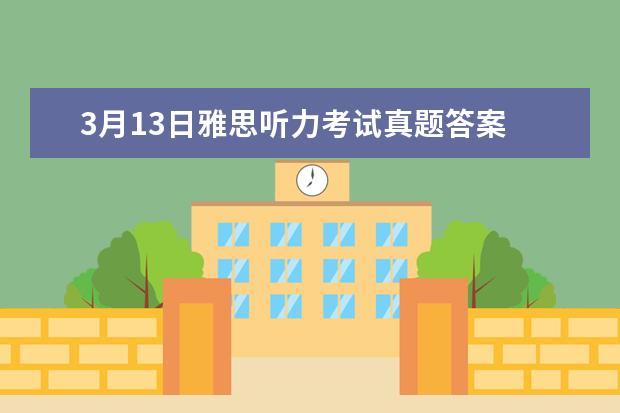 3月13日雅思听力考试真题答案 2023年11月23日雅思听力考试真题及答案 2023年6月19日雅思听力真题与答案
3月13日雅思听力考试真题答案 2023年11月23日雅思听力考试真题及答案 2023年6月19日雅思听力真题与答案
 2023年11月23日雅思听力考试真题及答案 2023年6月19日雅思听力真题与答案 3月13日雅思听力考试真题答案
2023年11月23日雅思听力考试真题及答案 2023年6月19日雅思听力真题与答案 3月13日雅思听力考试真题答案
 2023年6月19日雅思听力真题与答案 2023年6月7日雅思听力真题解析 2023年11月23日雅思听力考试真题及答案
2023年6月19日雅思听力真题与答案 2023年6月7日雅思听力真题解析 2023年11月23日雅思听力考试真题及答案
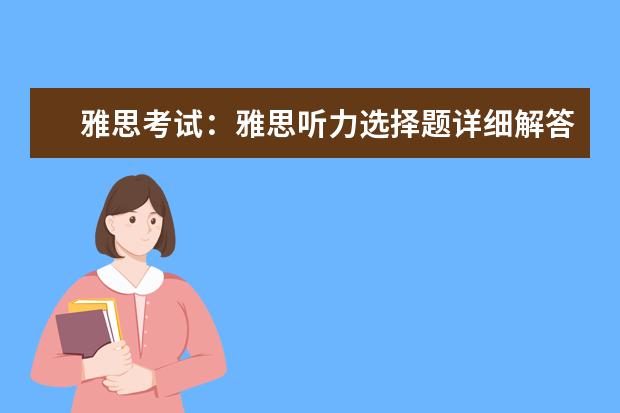 雅思考试:雅思听力选择题详细解答 2023年11月23日雅思听力考试真题及答案 2023年6月19日雅思听力真题与答案
雅思考试:雅思听力选择题详细解答 2023年11月23日雅思听力考试真题及答案 2023年6月19日雅思听力真题与答案
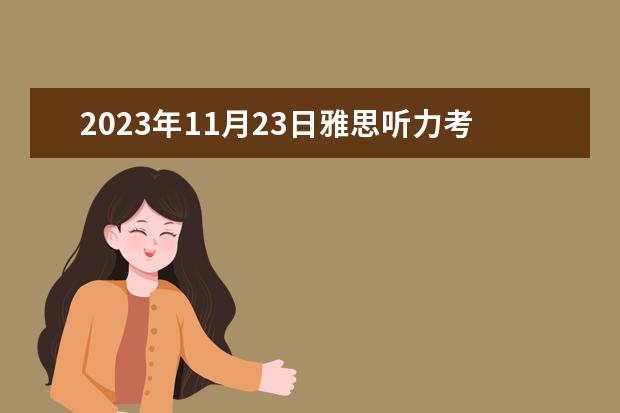 2023年11月23日雅思听力考试真题及答案 2023年6月19日雅思听力真题与答案 雅思考试:雅思听力选择题详细解答
2023年11月23日雅思听力考试真题及答案 2023年6月19日雅思听力真题与答案 雅思考试:雅思听力选择题详细解答
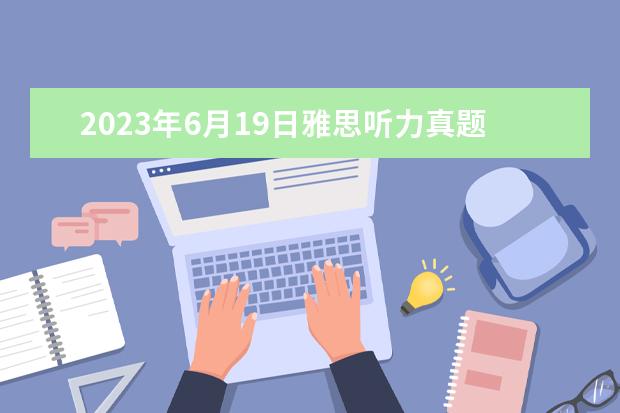 2023年6月19日雅思听力真题与答案 3月13日雅思听力考试真题答案 2023年11月23日雅思听力考试真题及答案
2023年6月19日雅思听力真题与答案 3月13日雅思听力考试真题答案 2023年11月23日雅思听力考试真题及答案
 2023年3月13日雅思听力考试真题答案 请问2023年10月23日雅思听力考试真题及答案 11月30日雅思听力考试真题答案
2023年3月13日雅思听力考试真题答案 请问2023年10月23日雅思听力考试真题及答案 11月30日雅思听力考试真题答案
 10月30日雅思听力考试真题及答案(2023年11月23日雅思听力考试真题及答案)
10月30日雅思听力考试真题及答案(2023年11月23日雅思听力考试真题及答案)
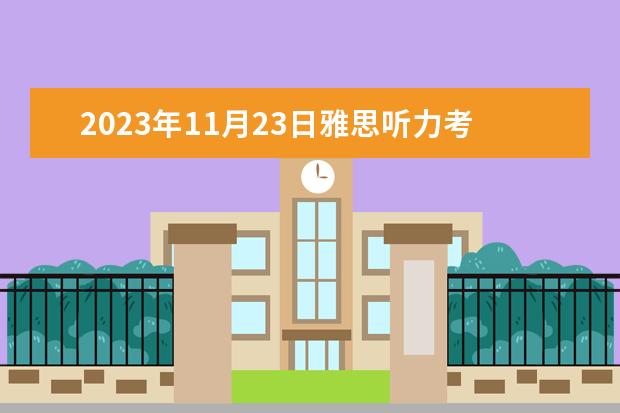 2023年11月23日雅思听力考试真题及答案(雅思2023年10月16日听力考试真题及答案)
2023年11月23日雅思听力考试真题及答案(雅思2023年10月16日听力考试真题及答案)